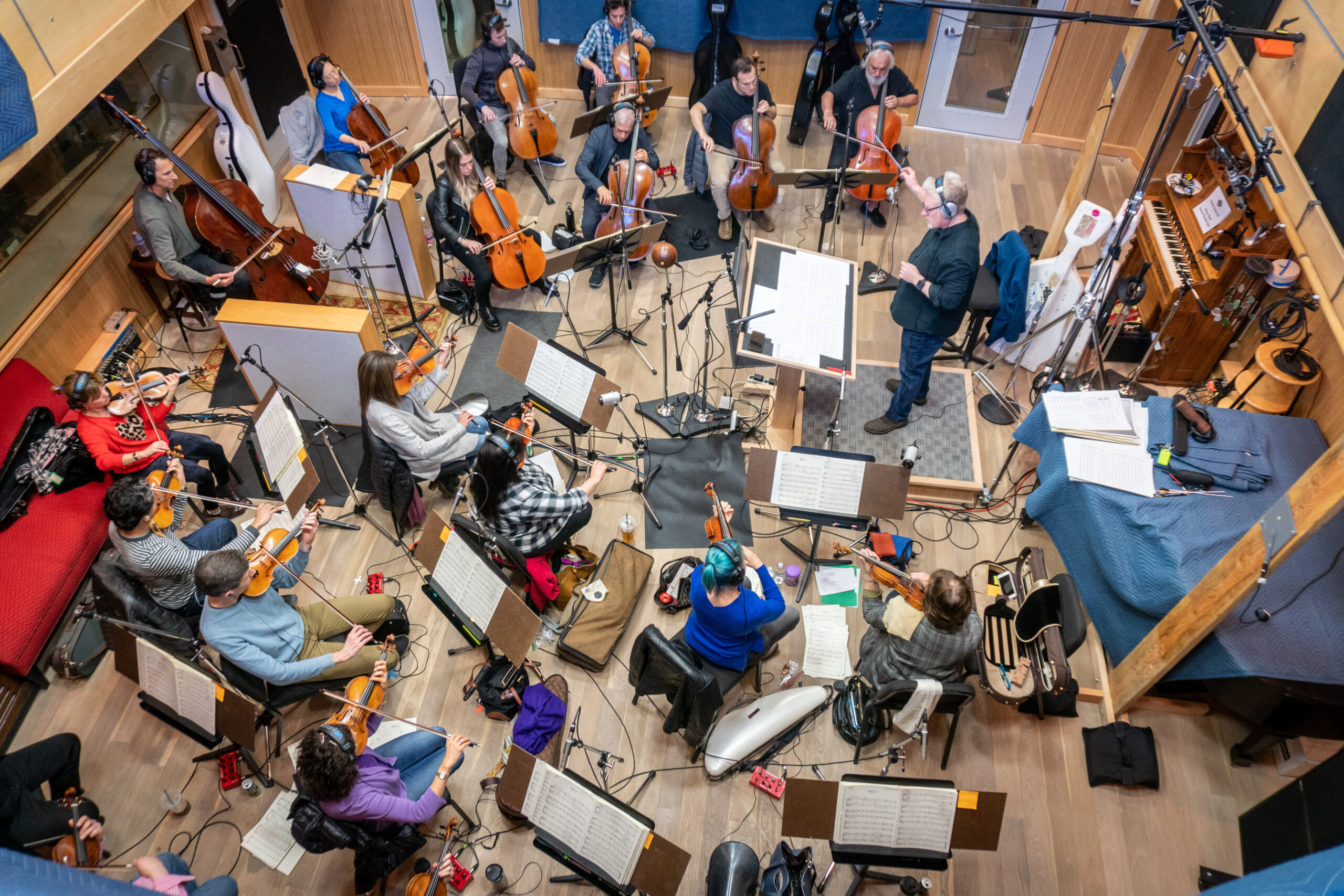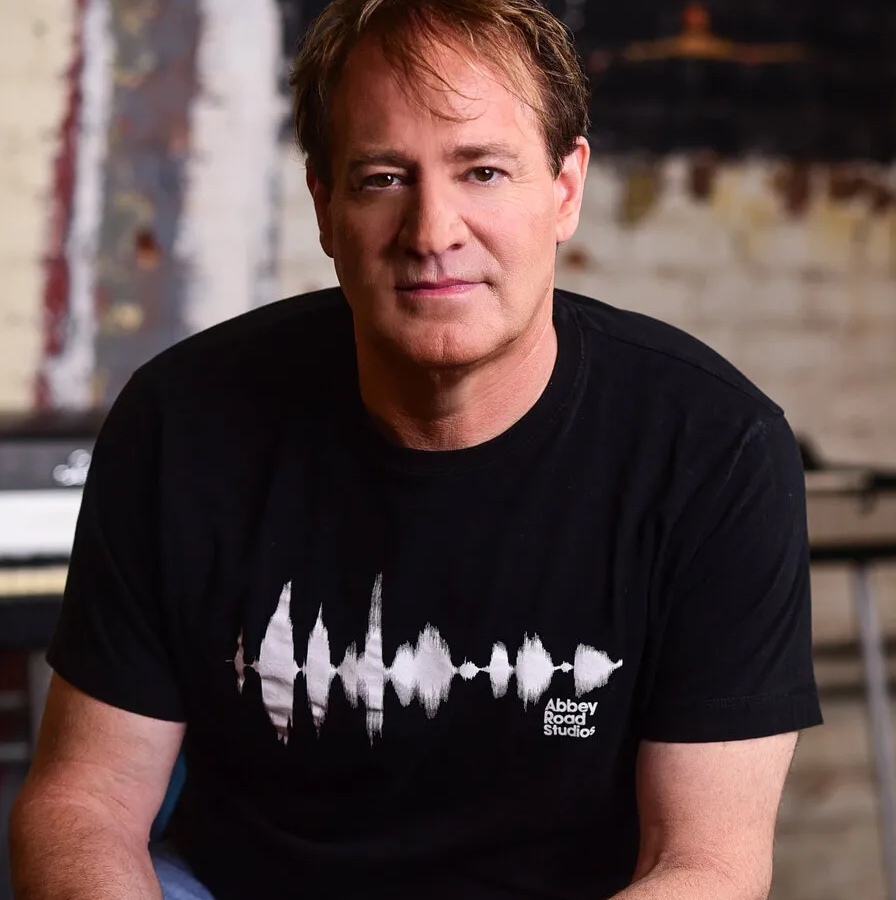
Born in England and ensconced in Los Angeles, composer / orchestrator Tim Williams has certainly heard his inner feminine spirit scarily roar with she-demons, satanic metalheads and a deranged, cleaver-wielding farm girl with a lush Hollywood orchestra in her head. Yet Williams is just as capable of hearing tenderness, no more so than in turning a soccer underdog into a winner in the sport, and more importantly in the company of her hangdog dad south of the border. Such is the touching reconciliation that drives “Gringa” on and off the field while scoring goals in any number of musical genres from energetic Latin rhythms to angelic female vocals, guitar surfing grooves, soft strings and stirringly symphonic save the goal kicks.
With a background in stunts for Marny Eng (“The Predator) and second unit direction for E.J. Foester (“Godzilla”), “Gringa’s co-directing credit for this married couple also marks an impressive step together into feature direction. It’s graced at its center by a winningly sympathetic performance from Jess Gabor (“Shameless”) as a wayward, suddenly motherless teen who helps redeem her ex-soccer star dad-turned-haphazard Mexico coach (“White Lotus’” Steve Zahn, handing in another wonderful seriocomic performance). Given an affectionate subversion of Mexican stereotypes that also doesn’t shirk away from relationship drama, Williams’ numerous styles in an affecting tonal whole make for a movingly melodic soundtrack and film that’s the definition of a small indie that can, as well as playing a particularly empathetic side for an affable composer in family company.

You’ve really been branching out into humanistic scores with “Finding You,” “Southern Gospel” and “The Swearing Jar” apart from your horror assignments like “She Came from the Woods,” “We Summon the Darkness” and especially “X’s” sequel “Pearl,” which you co-scored with Tyler Bates. Do you welcome that change of pace?
I really enjoy doing a variety of scores. It can get tiring doing a similar type of score again and again, so for me, part of deciding which films to score is looking for ones that give me an opportunity to try something new and challenging.

“Gringa” certainly hits a lot of genres from south of the border comedy to sports film and daughter-dad relationship. Did that make this particularly appealing to score?
Very much so. It gave me the opportunity to try something completely new and work with such Latin music legends such as Luis Conte, one of the best percussionist in the world, the late guitarist Ramon Stagnaro, Ximena Sariñana, who sung vocalization on the score, as well as Gil Sharone, one of LA’s top drummers. It’s ultimately a dramedy, so it allowed me to both score the emotion as well as some really funny comedic sequences with Steve Zahn doing his usual brilliant thing.

“Gringa” Co-Directors E.J. Foerster and Marny Eng
“Gringa” is the first feature from Marny Eng and E.J. Foerster, both of whom otherwise have extensive credits in stunts and second unit directing. What was your collaboration like?
Both Marny and E.J. have decades of experience working on some of Hollywood’s top films. It was an honor to be asked to score their directorial debut, and I couldn’t have asked for nicer people to work with. “Gringa” is such a heartfelt film, with an estranged father-daughter story at its heart. The cast of Steve Zahn (“White Lotus”), Jess Gabor (“Shameless”) and the legendary Judy Greer (“13 Going on 30”) are so wonderful and lead to some amazing opportunities both dramatically and comedically.

Gil Sharone and Luis Conte
“Gringa” makes a point about subverting gringo’s expectations about Mexico. In that way, how did you want to play your approach to Latin music?
One of the conversations that I loved was the influence of reggaeton music on that part of Mexico. I loved the beachy, surf vibe it gave as well as how it added energy and crossed over into the soccer scenes. Ramon and Luis, with their deep understanding of Latin music helped bring such a great feel and authenticity to the music. I also had Gustavo Borner, who I think at this point has won over 20 Latin Grammys, engineer it.
How do you think Marge fits into the musical tradition of a sports underdog hero, and how did you want to play her, particularly in your use of the female voice?
Jess Gabor does such a wonderful job of playing Marge, who is not great at soccer and lives with her single mom played by Judy Greer. I wanted a ‘Marge theme’ that was contemporary and draws you into her pain and loneliness. I had the wonderful Ximena Sariñana do vocalizations over the theme and throughout the film to help give you the sense of her loneliness and loss.

Ximena Sariñana records vocals for “Gringa”
How did you want to reflect the spirit of Marge’s mom that hangs over her and Jackson?
Again, the “Marge theme” needed to continue the spirit of Marge’s mother and ultimately comes full circle at the end of the film where it is reprised but with a final sense of letting go of the pain and sorrow. Ximena does a great job of evoking this through key story moments of the film.
Talk about your approach to her dad Jackson. How did you want the score to help develop their relationship?
I love Jackson, especially because of Steve Zahn. He plays a completely clueless, broken man who has run away from life and responsibilities. I used a bizarre combination of Latin rhythm and a didgeridoo of all things to evoke this lost soul. One of the great arcs of the story is how his daughter shows up and the impact she has on his life and ultimately the impact they both have on each other. While the score starts in this boozy strange world, the music arcs over the course of this relationship to become more serious, heartfelt and connected.

Jess Gabor and Steve Zahn in “Gringa”
“Gringa” has as many funny moments as heartfelt dramatic ones. Is it difficult to hit those tonal shifts?
The film did such a great job of delineating and shifting between the moments of humor, tragedy, and deep emotion that musically it was a matter of following the film’s lead. The palette shifts from Latin drums/percussion to more ambient guitar and strings as the moments change.
“Gringa” takes a dark turn when Marge decides to cross back over the border. Tell us about scoring this scene.
I think the film does a good job of showing the realities of the danger and vulnerability people face trying to get across the border. I played this section of the film straight with full investment in the danger and jeopardy. Even though “Gringa” is ultimately a dramedy, I wanted this emotional and jarring sequence to feel authentic and poignant.

Ramon Stagnaro
Guitar plays a big part of “Gringa’s” score. What were those sessions like, and how much improvisation does a player have on them?
The Electric guitars/Bass were played by Tyler Bates and the Nylon and Acoustic guitars were played by the late Ramon Stagnaro. Tyler is a frequent collaborator and it’s always amazing when he brings his guitar and bass skills to a project. He covered the moodier and more ambient electric guitar as well as much of the reggaeton and weird Bass vibe for Steve Zahn. Ramon was in a league of his own as a Latin guitar player. Because this style was so in his fingers, I just let him go for it. Much of the virtuosic guitar playing is me just saying have at! There are two really tender scenes, the church scene and the quinceañera, where I wanted the authenticity of a local solo guitar feel. Ramon improvised those and then I later added strings. It was such an honor to have worked with him. Sadly, he passed from Covid and is greatly missed.
What’s the challenge to scoring a big sports game, particularly when it comes to soccer?
The challenge is always bringing lots of energy and scoring the emotional components of the game: the excitement, the fear, the aggression, the loss, and the victories. Every soccer game in the film comes from a different perspective and trying to capture each one in a unique way is the challenge.

Talk about your co-score with your frequent collaborator Tyler Bates for Netflix’s “Agent Elvis,” and recreating styles that hit everything from 60’s rock to secret agent adventure. And on that note, what is the sound of Elvis Presley?
I have had the pleasure of working with Tyler now for over twenty years. Recently we have had the opportunity to collaborate on “Pearl” and “Agent Elvis” together – again, with very disparate scores. “Agent Elvis” was a blast as the team at Sony Animation were so talented and great to work with. I am a huge fan of the sound of the late 60s and of course John Barry in the spy language. This was a wonderful chance to evoke the 60s and to take Elvis into the spy zone. Needless to say, we thoroughly enjoyed crafting the sound for this show.
 You’re also quite busy as an orchestrator on the hit Netflix show “The Station Agent’ and “John Wick 4,” as well as the upcoming films “Boogeyman” and “Tiger’s Apprentice.” Tell us what that job entails, particularly on these projects.
You’re also quite busy as an orchestrator on the hit Netflix show “The Station Agent’ and “John Wick 4,” as well as the upcoming films “Boogeyman” and “Tiger’s Apprentice.” Tell us what that job entails, particularly on these projects.
When I orchestrate, I take the mockup of the music (done mostly with sample libraries) and transcribe and create the actual parts that the orchestra or musicians will play on the scoring stage. This involves taking some creative license, making sure the balance of the sections is going to work, as well as an understanding of instrument ranges and balance. This often involves a fair amount of interpretation. One of the advantages that I have is that, as a composer, I approach the job with an understanding of the intention and context of the music. This helps to accurately bring orchestral colors and textures that support the story and the intention of the composer’s music. If composing is right brained (creative, chaotic and explorative), orchestration is more left brained (organizing, programming and mathematical). As much as it is enriching to compose different types of scores, it is equally enriching to change hats from composer to orchestrator and help bring other composer’s visions to light. Ultimately it enhances my appreciation and understanding of music.
Tell us about your upcoming scores for “Founders Day” and “Intermedium.”
“Intermedium” is a really wonderful retro rom-com musical about an OCD teenager (Emily Keefe) who discovers there is a ghost in her room. She ends up, despite her best judgment, falling for the ghost (Beau Minniear of “Minx”) who reminds me of a young Patrick Dempsey. Apart from a deliberate 90s style rom-com piano and orchestral take, I wanted something quirky and odd for Emily’s OCD character at school, which resulted in these cues of odd percussion and vocals performed by the incredible Joy Summer Davis. It was recorded and mixed in New Zealand and is now in post. “Founders Day” is a fun whodunit slasher film I am finishing up. For this film I am really enjoying creating a gritty chaotic intense processed sound.

What do you hope for “Gringa?”
“Gringa” has won the audience award for every festival it’s been in. Because it’s a small film, it is one that people will have to go looking for. It has a limited run in theaters and will be available to buy or rent on VOD. I think people will discover it.
See “Gringa” on VOD HERE
Tim Williams’ score for “Gringa” is available on Movie Score Media HERE

Visit Tim Williams’ website HERE


